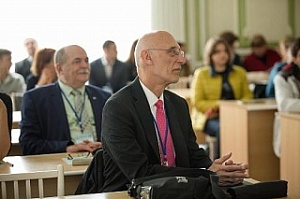The International Forum on Problems of Electronics, Photonics, Radiophysics, and Alternative Energy - Nano and Giga Forum NGC / CTRP 2017 took place recently at TSU. Scientists from 24 countries discussed semiconductors, new materials from carbon nanotubes, the creation of devices for energy storage, and other topical issues.
- The forum has great potential: there was an exchange of ideas, and many new contacts were established between international specialists and TSU scientists – and precisely what we have sought, said Anatoly Korkin, the organizer of the forum and a professor at the University of Arizona. - In general, the event, which attracted leading experts in photonics, electronics, and alternative energy, was successful. The next forum will be held in 2-3 years.
More than 250 specialists took part in the forum, and there were more than 600 participants including students. Experts from the United States, Japan, Germany, Korea, France, Italy, and other countries presented their developments in alternative energy, materials from carbon nanotubes, new semiconductors, and electronics.
- A lot of fresh ideas and proposals were expressed, I hope that there will be joint projects, - said Robert Nemanic, a professor at the University of Arizona.
The forum was held in Russia for the third time: the first two were in Moscow and this year at TSU. The conference “Actual Problems of Radiophysics”, a school-seminar on programming microdevices and computer architecture, lectures by international scientists, and meetings on innovations in high technologies, programming on chips, computer architecture, and modeling of materials and devices were held as part of the overall event.
In addition, the International Forum had an exhibition where institutions and companies presented devices for detecting and visualizing living people behind obstacles, a terahertz complex for diagnosing hidden heterogeneities, a device for creating additive metamaterials, a device for microwave warming of frostbite, and other developments.
At TSU is the StrAU Intelligent Materials and Technologies, where they are engaged in fundamental and applied research to develop new materials and technologies for creating them, as well as structures and systems based on them. It includes the Centre for Fundamental and Mathematical Physics, the Centre for Research in Semiconductor Materials and Technologies, the Centre for Research in Materials and Technologies, the Scientific Research Institute of Applied Mathematics and Mechanics, the SFTI and the faculties: Faculty of Chemistry, Faculty of Physics, Faculty of Radiophysics, and Faculty of Physics and Engineering.

